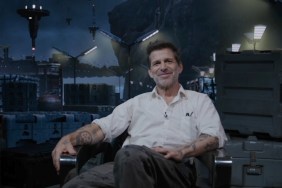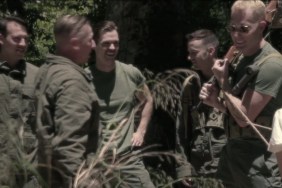
The Messenger plays as something of a companion piece to Kathryn Bigelow’s The Hurt Locker, but whereas The Hurt Locker kept your attention with instense action sequences leading into more dramatic “effects of war” elements, The Messenger is a much more somber and depressing feature, which should pretty much seal the fate on its box-office success. However, it has already won the affection of soldiers for its authenticity and carries some notable performances that may even find a way to sneak themselves into the Oscar conversation.
Ben Foster stars as Will, a soldier who has returned home from the Iraq War after risking his life to save his fellow soldiers. He’s injured and has been assigned the task of working as a Casualty Notification Officer alongside Woody Harrelson playing his senior officer Tony. Dealing with his own post traumatic issues, Will must now find the courage to inform families a loved one has died serving their country.
Of course, such material carries obvious dramatic weight for any film and while it is executed well in The Messenger it is hard not to look at it as another post traumatic war film tugging at your emotions as a result of the misfortune and sadness of others. There is very little happiness found in this film and if you are an anti-war film moviegoer this one definitely won’t be on your must watch list. Then again, it’s not a film meant to go down easy.
Offering up both sides of the equation, The Messenger follows a man that could have just as easily been one of names on his casualty list as he is the man now reading them off. It’s an exploration of the effect war has on everyone that knows, is and loves an enlisted soldier, and these are the stories we don’t often hear about. We don’t hear about them because they are depressing. To hear about the many that die and the effect their deaths have on their families wouldn’t make for highly rated primetime news. Instead our spirits are meant to be kept high. As a result you could argue that makes this an important movie, but if filmmakers are looking to tap into audiences more interested in explosions and violence they are going to find it hard with films such as The Messenger, which is more likely to play to audiences already mildly aware of the plight our soldiers and their families are facing. At least those who do show up to see it will be greeted with some solid performances.
Foster has never been an actor that particularly appealed to me. His intensity has never seemed genuine as much as it felt he was putting on a show. Admittedly, he is much more restrained in The Messenger, making for one thing I particularly enjoyed. Moverman’s film does its best to avoid stereotypical war movie cliches all while doing its best to remain grounded in reality.
Most impressive was the performance of Samantha Morton who’s hard-pressed to turn in a poor performance even when her films don’t particularly impress me (Synecdoche, New York for instance). In The Messenger she plays a young widow that captures Foster’s attention after he has just delivered the news of her husband’s death and their story becomes the film’s largest leap in logic. However, Morton and Foster have a particular chemistry that works even despite the melodramatic aspects of the storyline they are catering to. This isn’t to say such a situation can’t happen, or doesn’t happen, as much as it seems like a convenient path for the film to follow eliminating any further risk.
Steve Buscemi has a small role in the film playing the father of a deceased soldier and delivers an excellent speech toward the end of the film that speaks to an even larger dedication military families have taken and as a result makes their tormented sacrifices all the more important.
So, yes, The Messenger is an important movie, and it’s also a well made movie, but that doesn’t change the fact it is overly depressing. It definitely tackles the war from a different angle than I had seen to this point, but it doesn’t really offer up any surprises or eye-opening revelations I hadn’t yet seen or explored in a variety of other features, with The Hurt Locker being the obvious, most recent example. The difference there being Kathryn Bigelow’s film managed to equally entertain and inform and do it without sending audiences out of the theater in a hearse.










